2022 has been a year full of change and progress:
- I moved to Lisbon, leaving Milan after 7 years;
- Visited the US for the first time;
- Closed the biggest business deal of my life (still under NDA 👀);
- Caught COVID once, then caught it again;
- Grew my startup at an incredible pace;
- Moved in with my girlfriend.
Even a couple of those things would make a year hectic, but all of them in a single year was a lot to manage. I'm happy to be ending the year on a positive note with most things sorted out, and looking forward to a calmer 2023.
Personal
Moving to Lisbon

At the end of 2021, I decided it was time to move somewhere else in Europe. Partly, because I did not like life in Milan anymore, with its cold winters, grey clouds, hot summers and polluted air, partly because of the hostility of Italy towards business and entrepreneurs. I have had enough.
Lisbon had popped on my radar a few months back. Everyone was touting the great weather, cheap cost of living, amazing quality of life and amazing NHR program. Then, Pieter Levels made it easy to automate the bureaucrazy of moving to Portugal with Rebase, so I took the consultancy call and was sold on the idea of moving there.
I thought it would be a matter of selling my things and buying a one-way ticket, but it really took a lot of work and mental energy to plan everything. Way more than anticipated. From January onwards, until I finally took the flight, the move completely took over my life and thoughts. After all, I had been living in Milan for the past 7 years, so there were lots of things to do, lots of people to say goodbye to, and lots of emotions involved.
Once in Lisbon, it took a while to settle. Especially because of how hard it was to find a suitable place to live in. With this big influx of foreigners and very few available houses, it took months to find a place that wasn't crazy expensive and high quality. Fortunately, I ultimately managed to and am writing this from the comfy sofa of my new apartment.
For the biggest part of the year, not having a comfortable place to stay stressed me out, made me anxious, and it made life less enjoyable.
On the bright side, I found Lisbon to be a truly international city with many likeminded people to meet. I made some new friends and professional connections.
It felt harder to get out of the tech bubble and meet local people, a requirement to feel truly integreated here. To this end, I plan to learn portuguese and immerse myself in the local culture more next year.
Lisbon: expectations vs reality
Lisbon is a great city, but be aware of its drawbacks:
- It's sunny most of the year, but it rains a lot Nov-Jan (this year even more than usual);
- Housing used to be affordable, but now it's not anymore. What's worse, the quality of housing is often low, with many old buildings that are deteriorating and patched up by owners to make them look presentable and fool the next short-term renter.
- Lisbon is very walkable, but there are tons of hills so expect your cardio to be put to a test.
- Lisbon is dirty: the streets are filthy, and it's not uncommon to have to dodge trash while walking on sidewalks, especially in the party areas. I see garbage collectors hustling to get the city clean after each weekend, but local government should not allow it to get this trashed. It's really a shame.
On the bright side:
- In Lisbon, it's easy to meet people. I often run into friends and acquaintances while strolling around; something that never happened to me in larger cities.
- I love Lisbon for its international and lively atmosphere. There's always something going on, but it doesn't have the same hectic energy as New York. This is likely due to the relaxed nature of the Portuguese people, which helps to balance it out.
- It's full of amazing co-working spaces and bars to work in.
- It's beautiful and charming, especially at sunset if you go uphill and look down on all the roofs and the bridge.
In summary, here in Lisbon, I can walk everywhere, afford a nice house in the city center, get to the beach in a 20 minute drive (or affordable Uber ride), and have a pleasant day-to-day life that allows me to work effectively. All while meeting new people that work in tech effortelessly.
This is all great, but would I live here for the rest of my life? Not sure.
Work
Our first company retreat
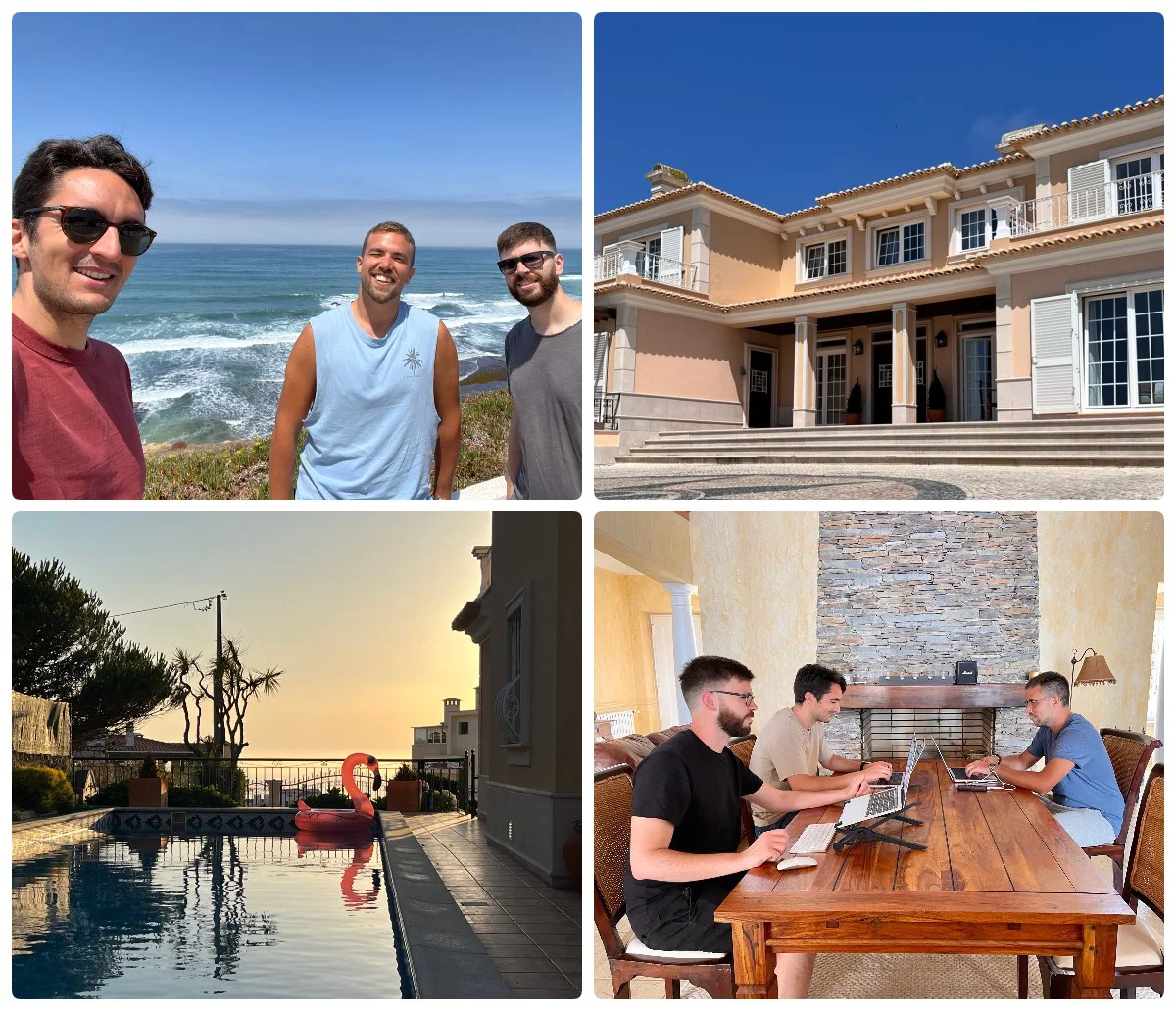
In July, we had our first company retreat in Ericeira, Portugal. It was a joyful moment for the whole team. We hand's seen each other for a while and had to recharge our social batteries a bit. It's amazing how quickly our worries can dissipate when we share a beer together.
For me it was also a realization of how far we had come as a company: paying 3 salaries, renting a huge villa, and still cutting a profit at the end of the month, all thanks to the amazing growth Typefully has seen this year. MRR materialized out of this air in front of my eyes, and stopped being just a meaningless number.
I am excited about our next retreat, now that's it's the 4 of us. Working remotely and async + meeting each other 2-3 times per year for a week to discuss roadmap, have fun together, and bond is really a sweet spot.
Doubling down and scaling Typefully
I always had this sense of urgency at every point of the year, feeling like we weren’t doing enough as a team. But reflecting on it now, I am surprised by everything we have accomplished in a this small time.
Typefully's MRR grew 7x this year. More than that, I am the proudest about how good the product is today compare to last year.
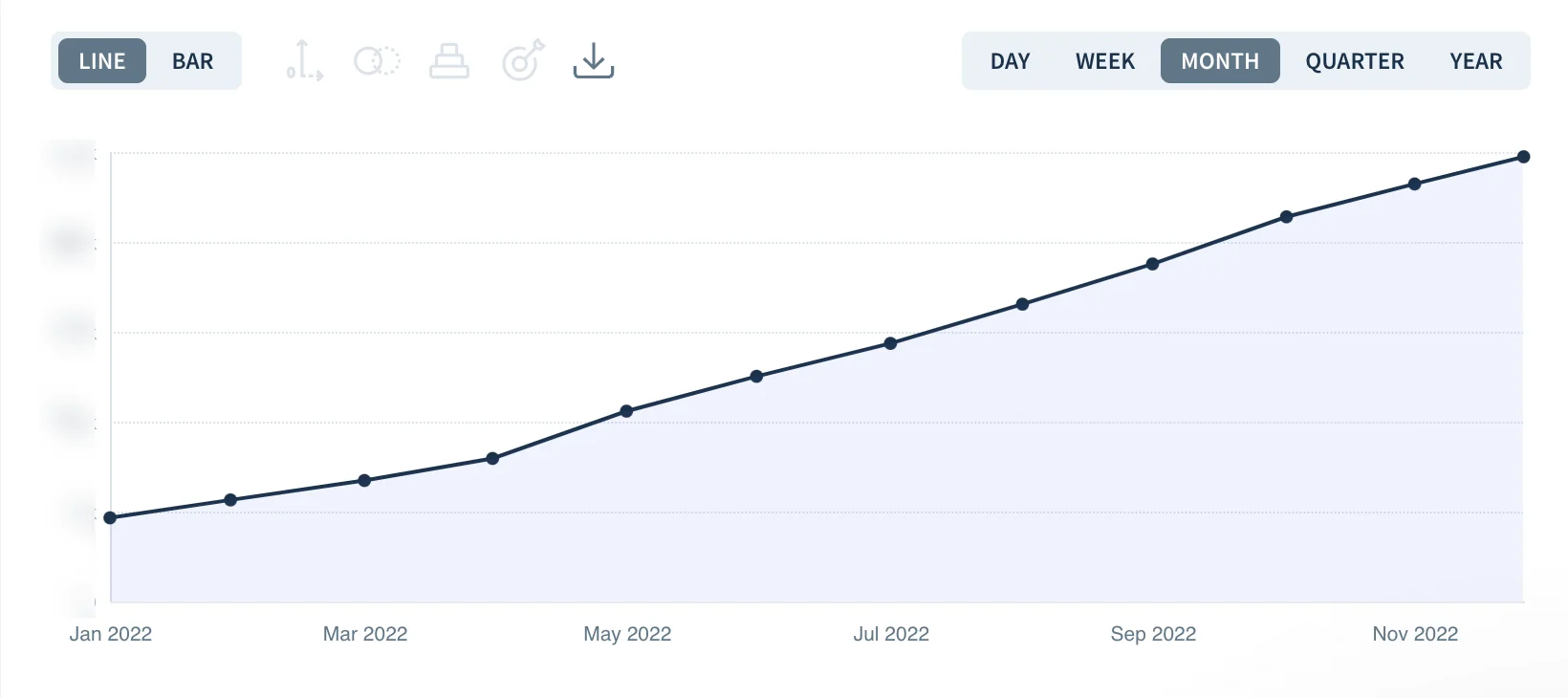
Luck and being in the right played a big role, but we have been really working our asses off this year and delivered a ton of value to the people that decided to support us.
To give you an idea, look at what Typefully looked at the end of 2021 (left) vs 2022 (right):
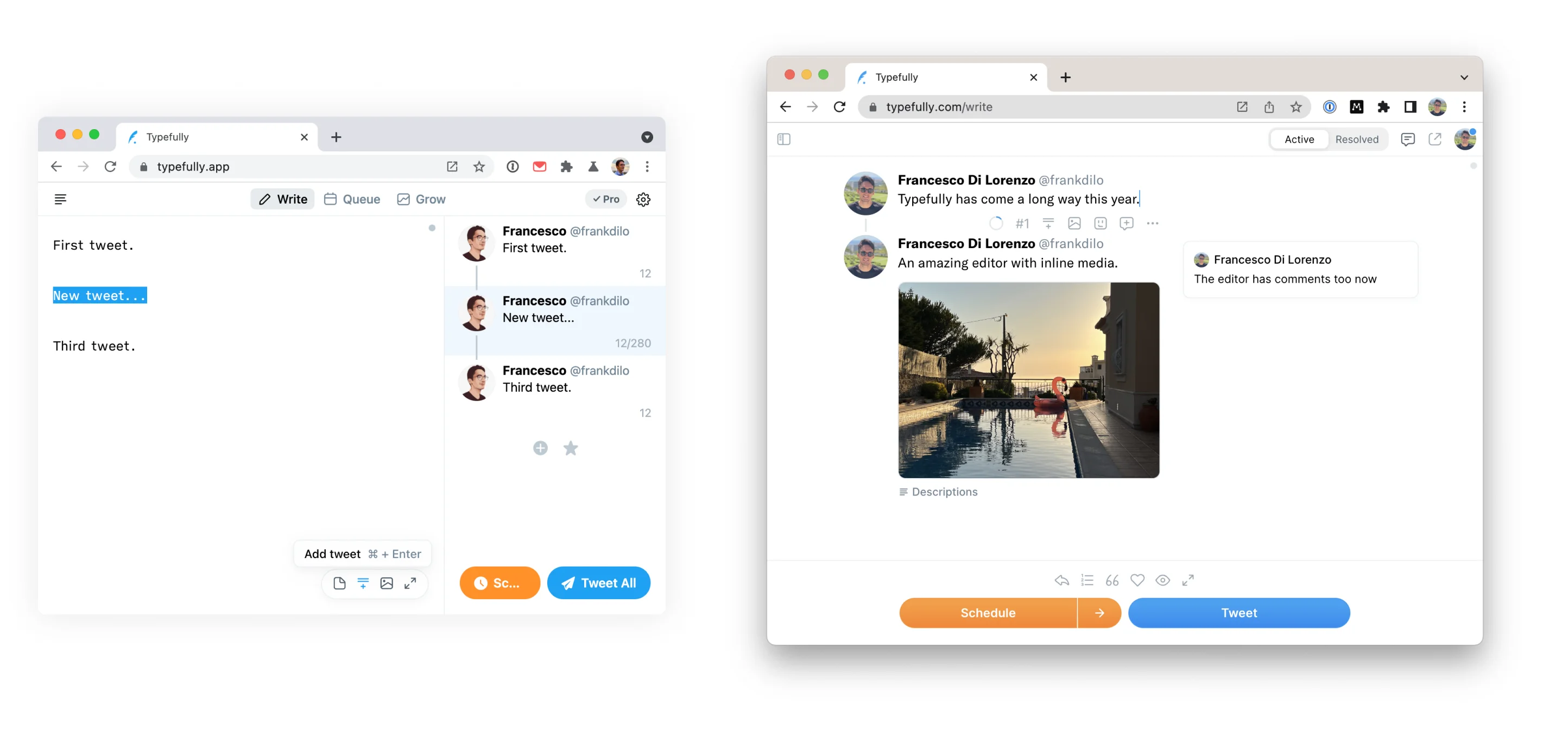
We went from a plain text area with very few features to a rich text editor with inline media, comments and an AI assistant (and too many more features to list here).
This year we shipped:
-
In February, we released a powerful new rich text editor, laying the foundations for many new features and improvements. It's the most beloved Typefully feature, allowing users to see a live, high-fidelity preview of their tweets as they will be posted on Twitter. This was a big bet for us and a scary move at the time. People loved our former editor and it was what made Typefully great. Despite my doubts, I'm glad we took the jump. In retrospect, it was the right choice.
-
We then released Profiles, allowing users to share content on Typefully with one click, as well as post to Twitter. This feature has yet to reach its full potential. With more customizations, Typefully could become a full-fledged blogging platform. We plan to do more, but it's hard to prioritize this over other projects.
-
Between March and April, we released many new features. Some were paid and most were enabled by the rich text editor. These features increased the touch points for free users to upgrade and boosted our revenue growth, such as:
- Automatic thread generations when pasting text
- Quoting the first tweet at the end of a thread
- GIPHY integration
- Automatic tweet numbering
-
In May, we released a major update: Collaboration. This enabled individual users to create teams and invite friends, coworkers, and ghostwriters. It has been a huge success, significantly increasing our growth through expansion revenue - the holy grail of SaaS.
-
In June we released our Zapier integration and our (still kinda private) API that enabled many powerful workflows and the creation of our Raycast extension. It was a great moment when Daniel Ferguson first reached out and built on top of the API we provided. It really felt special and that we were really building a platform used and love by tens of thousands.
-
In July, we released Writing Prompts, tackling one of the hardest problems for our content creators; blank page syndrome. We still aren't 100% satisfied with the solution, but it has been a great start and users are loving it.
-
In August, we put a halt on new features since the team took 2-3 weeks off after this amazing shipping spree.
-
In September, we released Comments, a staple for collaboration and a highly requested feature. With Comments, users can now leave feedback, ask questions, and collaborate on tweets much more quickly and easily than ever before.
-
In November, we released Vesper, an AI assistant that helps you write better tweets and come up with new ideas. This feature has been incredibly transformative for me, making the product much more useful and eliminating a major obstacle I faced when publishing on Twitter: crafting quality tweets.
I'm amazed at how much we've achieved and the good stuff we're currently working on. For next year, I'm OK with reducing the pace of new features and focusing on quality and reliability. This was a challenge last year when shipping at this pace.
I am also extremely excited that we got a new team member in November. This is going to make us even faster and expand what we are able to achieve. I also love how the company improves when bringing in a new person. At this scale, each new hire has an outsized impact on the mood and culture of the workspace.
I hope to slowly expand the team more in 2022, maybe for customer support and growth roles. We'll see. I still want to remain an individual contributor for most of my time, and having too many people to manage could make that impossible
How our work style changed
Our working style changed quite a bit this year. We truly went all-in on some ideas that we kind of halfassedly implemented in the past, and this wildly improved our productivity and quality of life.
I am mostly talking about async work.
We don’t enforce specific working hours, but each of us roughly works 9 to 6 on their timezone, with flexible start/end times. It’s okay to start later, or take time off midday, as long as you keep track of it and make up for it later or in the weekend. This has the great benefit of allowing the team to practice fitness and hobbies mid-day, greatly superior to doing it at end of day when you are tired from work. It also allows for easier planning for social activities, and in general it encourages a better work-life balance; you feel less like your life is only about work during the week, with no (or minimal) loss in actual productivity.
To achieve this we had to be careful with how many meetings we had and how we collaborated.
We have 2 standup meetings per week to see each other and sync on progress. We put these at end of day to cause the least disruption. Each meeting lasts 30m-1h and is the only time when everyone is expected to be on..
We do big planning meetings (betting table style) once or twice per quarter, and when this happens we go much more in on talking live with each other, sometimes even having 2-3h meetings every day for a week.
It may seem like there is a big masterplan around this way of doing this, but in reality we reached this iteratively over many years of working together by following our own inclinations, needs, and noting what made us feel best about our days.
Adopting the right tools has been crucial for productivity to not take a hit in this environment. Basecamp and Loom have been key.
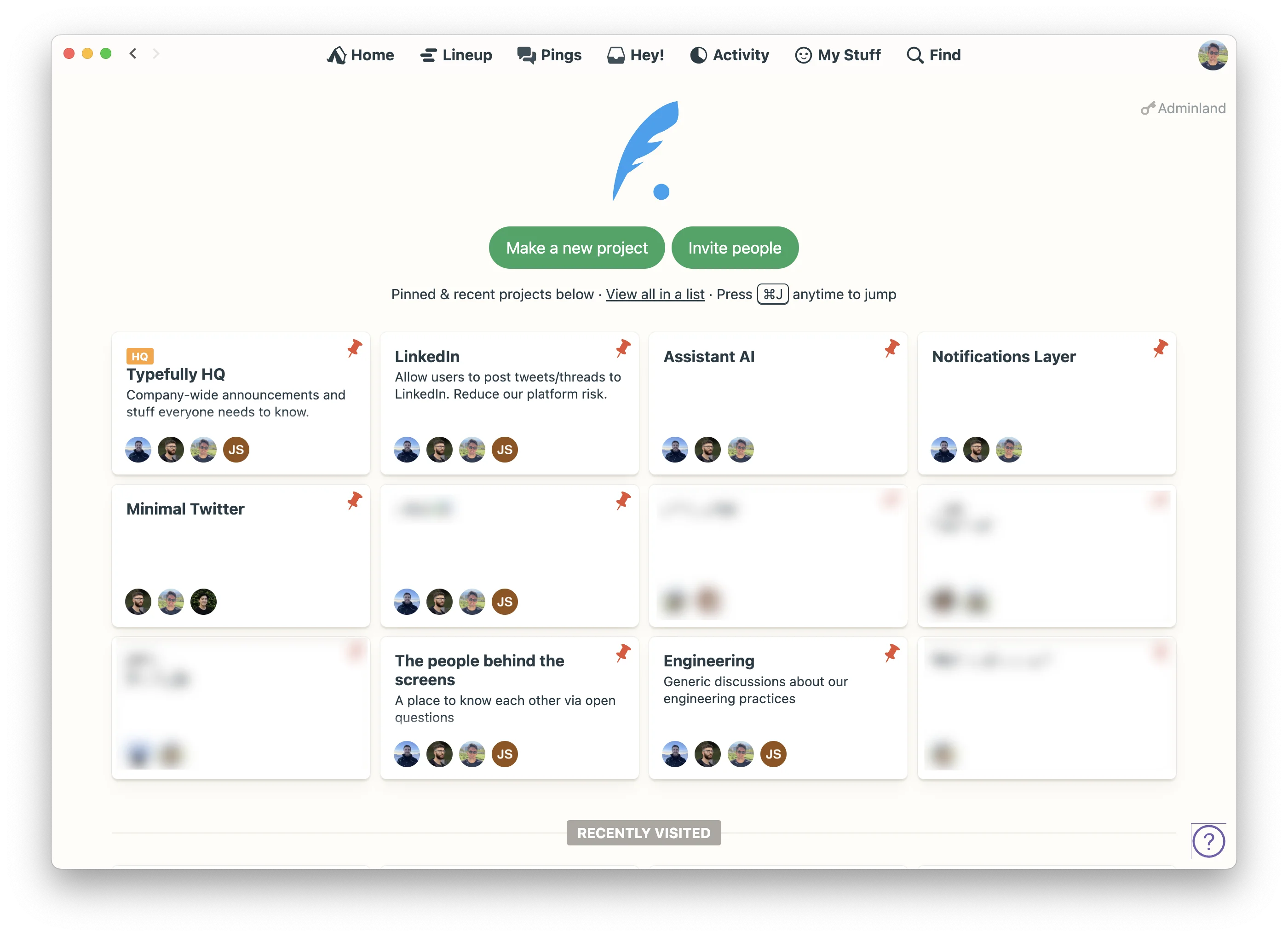
We default to Looms instead of having meetings, and only fallback to a real meeting when there is too much back and forth and need a higher-bandwidth channel. This happens surprisingly rarely.
Basecamp has been a huge help too in keeping track of the many projects we have going on. For each project we get a small little space with chat, todos, a forum-style message board, calendar and deadlines. Opening Basecamp we all now exactly what’s going on and who’s working on what. This has led to a great peace of mind for me.
Time tracking
Personally, I also started time tracking with Timery. This serves two purposes: making sure I work enough (not too much, not too little), and being aware of where my time goes.
I try to hit an average of 7 hours worked per day. Some days it’s less, some days it’s more. I use 5 categories to see where my times goes:
- Coding/making. It’s where I want to spend most of my time.
- Team & planning: reviewing code, having meetings, planning
- Customer support: replying to user emails and providing support
- Admin: accounting, bookkeeping
- Maintenance: making sure our systems stay up
- Other: other work time I don’t care to categorize
I get most of my enjoyment from building things and collaborating with my team so I try to spend as much time as possible in the first 2 categories.
This is what a typical week as been looking like for me:
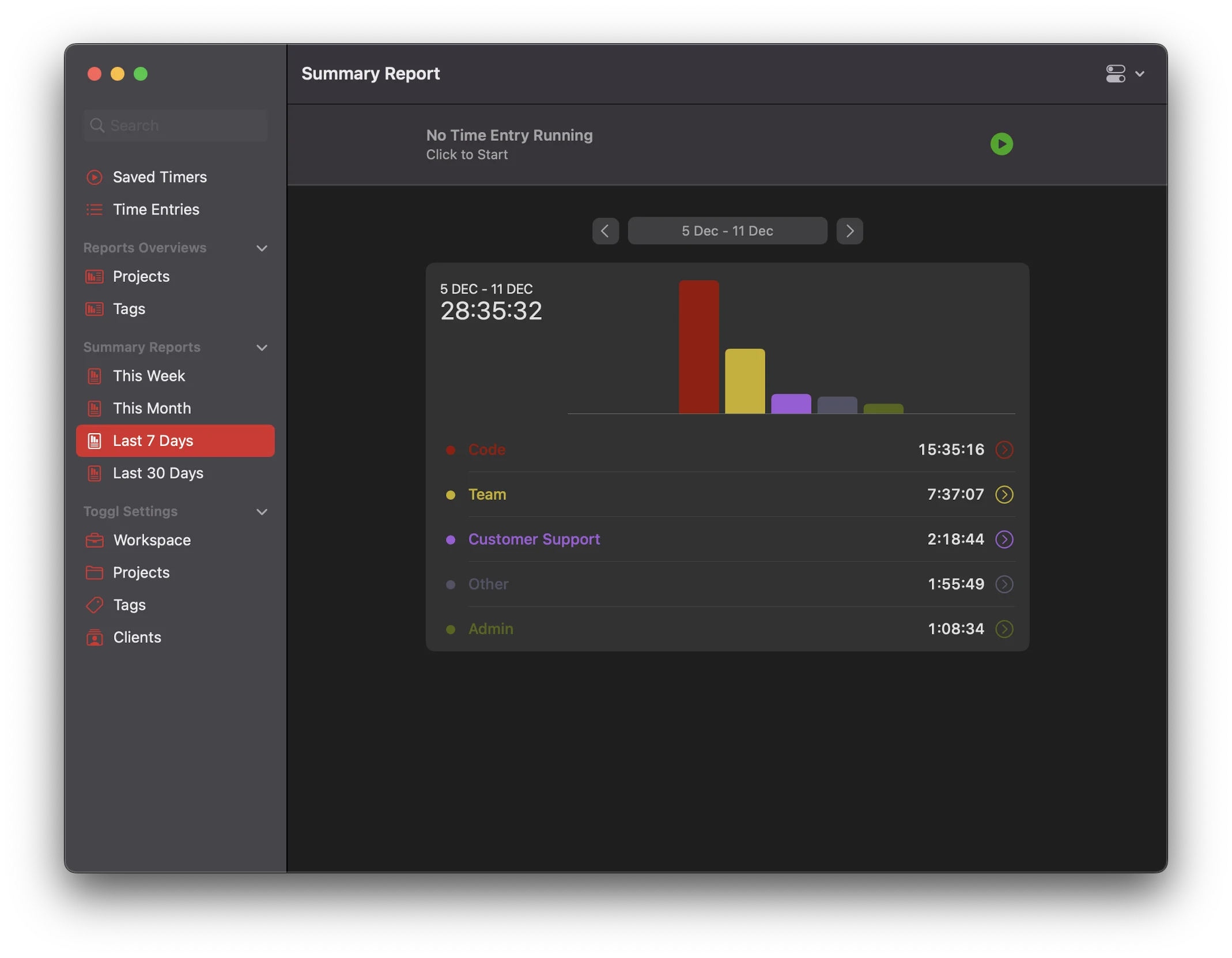
As far as planning goes, we have tried to stick with Shape Up by Basecamp, but failed. I think the approach is not meant for teams our size who don’t have a dedicated product team who’s always shaping features for the next cycle.
What we have landed on is a mixed approach where we decide what to work on once or twice per quarter and let projects take the time they need for completion. From Shape Up we retained the concept of the Betting Table and the fat-maker sketches for defining a feature without too many details, leaving ample autonomy to who'll work on it to work out the details. I am overall happy about this approach, even though not imposing a hard time limit may delay releases and leaves space for bloat and unnecessary complexity/features. As they say, work expands to fill the time available, even more so when the time available is unbounded. There is room for improvement here once again and I plan to try a few things with the team next year.
Taming complexity, being ok with things being broken at all times
This year I've learned that it's necessary to accept some technical debt in projects, and to learn to live with and enjoy managing it. Technical debt is an unavoidable result of a successful project that moves quickly, iterates on customer needs, and develops without a pre-defined plan. It's easy to be too hard on yourself or the team for poor choices (hindsight bias, my old friend), but that's not the right approach. With patience, look at what's wrong and decide whether to refactor, do a full rewrite, or bring in outside help if the task is beyond your current abilities.
Books and media recommendations
I didn’t read as much as I would have liked this year, but here are a few gems I discovered:
- 📖 The Beginning of Infinity: Explanations That Transform the World
- An instant classic and eye-opening book, this one explores the transformative value of good explanations and where humanity is headed. I plan to re-read it in the future since it was packed with stimulating and novel ideas that made me optimistic about the human condition. 5/5.
- 📖 What Money Can't Buy: The Moral Limits of Markets
- A must-read for turbo-capitalists who think markets are the solution to everything and always produce desirable outcomes. This book challenged my views on several topics.
- 📖 Principles For Dealing With the Changing World Order: Why Nations Succeed and Fail
- An intriguing examination of where the world is headed and compelling data on what are the most reliable indicators of a nation's success or decline. 4/5.
- 📺 Severance
- An absolute must watch with a very slow start. Give it 3 or 4 episode. 4.5/5.
- 📺 Succession
- The last season is just so good; perfect drama. Can’t wait for the next one. 5/5.
- 📺 The Crown
- With the death of Queen Elizabeth I want to do a deep dive into the history of the royal family and this Netflix series turned out to be really good. 4/5.
- 📩 Noahpinion
- I have been thoroughly enjoying the combination of economics, geopolitics, and news in this newsletter. It is entertaining, instructive, and refreshing. I have been a subscriber and avid reader for the past three months.